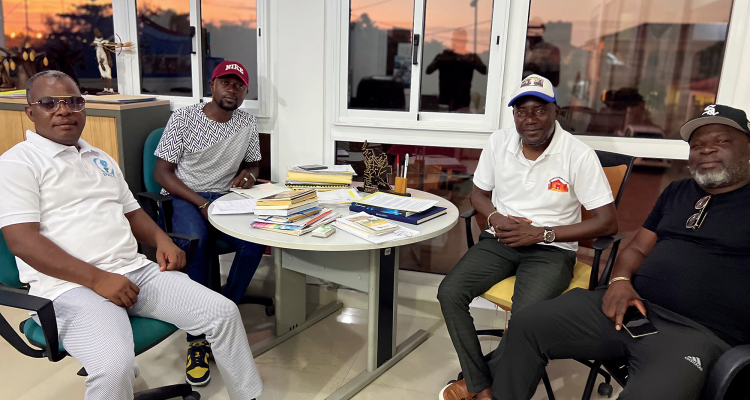Read in
Project participants learn to install a modern beehive in Bailundo, Angola.
Empretec training programme by UNCTAD is equipping them with the knowledge to explore new sustainable business opportunities.
Domingo Nvita Manuel Judite used to manage a guesthouse and a car rental company in Soyo, Zaire Province in Northern Angola, serving offshore oil workers. In this oil-rich region, the economy revolves around the petroleum industry, so it is natural for entrepreneurs to seek opportunities in the sector.
But the ever-fluctuating global oil prices have sometimes hurt local businesses, prompting Domingo and other Zaire Province-based entrepreneurs to consider diversification.
Training
Fortunately, in July 2022, Domingo and 25 others participated in an Empretec training programme that equipped them with the knowledge to explore new sustainable business opportunities, take calculated risks, and monitor set targets.
Empretec is a programme established by the United Nations Conference on Trade and Development (UNCTAD) to promote the creation of sustainable, innovative, and internationally competitive small- and medium-sized enterprises.
With technical support from UNCTAD, the National Empretec Host Institution, Prestígio-Liga de Empresários e Executivos de Angola, now directly implements Empretec entrepreneurship training initiated under the EU-UNCTAD Joint Programme for Angola: Train for Trade II. The initiative brought together various partners, including the Association of Entrepreneurs of the Province of Zaire (ASEEZ), of which Domingo is the current president.
The entrepreneur and his colleagues are now diversifying into sustainable agriculture—growing, processing, and distributing organic vegetables and fruits for local consumption and export.
In discussing the opportunities and challenges in the sector with Africa Renewal in Soyo, Domingo and other ASEEZ executives, including first vice-president Kiangani Nti Jose Pedro, second vice-president Ribeiro Pascoal Sebastião, and secretary-general Teofilo Mabinga Tati, said they aim to break away from the cyclical nature of the oil market by promoting sustainable business activities.
Domingo maintained: “We want to transform Zaire Province into a key commercial hub in Angola—and without oil money.”
“We want to shift the entrepreneurial mindset in Angola, and agribusiness is the next big thing,” Kiangani added.
Stars are aligned
They believe the stars are aligned in their favor. First, Zaire Province holds a strategic geographical advantage. Soyo is on the border with the Democratic Republic of the Congo (DRC), separated only by the Congo River and offering opportunities for cross-border trade.
Currently, cross-border trade is mostly informal, with traders transporting goods like potatoes and tomatoes by boat between countries.
Second, Zaire’s fertile land grows fruits and vegetables, and increased production of these items will catalyze the local economy, generate jobs and boost trade with neighboring countries.
Third, there are new technologies that can sustainably and significantly boost animal breeding.

Challenges
- Nevertheless, strict border-post processes and high tariffs impede cross-border trade.
On the flipside, bringing informal traders into a formal process will foster a sustainable economic ecosystem, which will increase revenues for authorities, they explained.
- Another challenge is the lack of financing from banks and other financial institutions, a concern Kiangani shared: “I have up to 350 hectares of land, and I am only cultivating 20 hectares.
I would like to expand my business, but that requires a lot of money, which I don’t have.” He cultivates tomatoes, hot peppers, mangoes, and rears livestock and poultry—goats, cows, and chickens. He sells his tomatoes to a middle company in Soyo, which processes and resells them to high-end consumers.
Could he eliminate the middle company? Yes, he stressed, but that will require a lot more financial power than is currently available. He would need a big storage facility and invest heavily in marketing, branding, packaging, and transportation.
- Also, there are problems related to plant diseases, such as fungi. There is a need for pesticides that can kill any fungus, insect, or plant disease and prevent the destruction of tonnes of produce like tomatoes.
- Another challenge is mechanization because manual labor is time-consuming and costly.
Kiangani noted, “Right now, we employ many people at different times of the year, waste a lot of time and pay a lot of money. Mechanization will boost productivity and, as a result, earnings that can be reinvested in the business.”
“If we can buy a tractor, we can modernize production,” corroborated Domingo, who hopes to organize ASEEZ into a cooperative to enable them to have stronger bargaining power in negotiations with financial institutions.
Saving for education
Many young men and women live and work on Kiangani’s farms, most hoping to save money and return to school. For example, Joao Manuel, the farm manager, aspires to acquire a university education.
“I am saving up to pursue a degree in agriculture,” he said, reflecting a commitment to skills development and knowledge enhancement. “And when I am done, I will return to agriculture.”
After a few unsuccessful attempts, Kiangani is once more trying his luck negotiating a deal with a bank that could lead to the establishment of a dairy product factory on the farms.
“Our goal is to milk the cows here [on the farms], produce cheese, yogurt, and other dairy products for the local market and export to other countries,” he explained, as herds of goats and cows wandered about. “We have an opportunity to export to the two Congos.” He was referring to the Republic of the Congo (Brazzaville) and the DRC.
With newfound skills—courtesy of UNCTAD, the government, and the EU—innovative ideas, and a vision of a more sustainable and prosperous future, Soyo entrepreneurs are eager to transition from oil to sustainable agriculture.



